|
|
|
Sort Order |
|
|
|
Items / Page
|
|
|
|
|
|
|
| Srl | Item |
| 1 |
ID:
114577
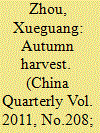

|
|
|
|
|
| Publication |
2012.
|
| Summary/Abstract |
For the peasants in rural China, the harvest season is the occasion when several different worlds - the business world of large companies, the entrepreneurial world of middlemen, local elites and peasant households - are compressed into the same social space, thereby inducing intensive economic and social interactions and crystallizing social relations among villagers, local elites and markets. Based on ethnographic research on the autumn harvest in a township in northern China, this study sheds light on distinctive modes of market transactions across produces, and diverse interactions between markets and local institutions involving different co-ordination mechanisms, rhythms and social relationships. A more nuanced image of market transactions emerges from these observations, calling for a more refined conceptualization of markets and further research on their implications for institutional changes.
|
|
|
|
|
|
|
|
|
|
|
|
|
|
|
|
| 2 |
ID:
160874
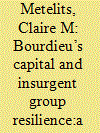

|
|
|
|
|
| Summary/Abstract |
The conflict between the rebel group, the Polisario Front, and the Kingdom of Morocco is nearing its 43rd year. Though under-reported, the conflict itself garners attention for the resilience – some would say tenacity – of the ethnically Sahrawi Polisario Front. Despite shifting regional and international politics and the nearly 150,000 Sahrawi refugees waiting in nearby Algerian camps, the rebel group has survived. What explains its resilience? This article uses Bourdieu’s ‘forms of capital’ to understand the Polisario Front’s persistence. Based on field research in Algeria, Western Sahara, and the United States, it finds that social, cultural, symbolic, and economic capital may provide an explanation.
|
|
|
|
|
|
|
|
|
|
|
|
|
|
|
|
| 3 |
ID:
169863
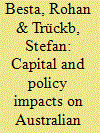

|
|
|
|
|
| Summary/Abstract |
This paper investigates whether capital constraints are evident for uptake of small-scale solar photovoltaic installations, using cross-sectional regressions with Australian regional data up to March 2019. There is an inverse U-shaped relationship between a number of different measures of capital and small-scale solar installations for both the 0–10 and 10–100 kW capacity categories. The positive relationship between capital and solar installations at the low end of the capital distribution suggests that capital constraints may provide an ongoing challenge for policymakers seeking to encourage the uptake of small-scale solar installations. There is also a negative association between average income and small-scale solar installations. Policymakers seeking to increase small-scale solar installations may achieve efficiency gains by targeting capital constraints rather than income constraints. An effective capital subsidy for addressing capital constraints, the Small-scale Renewable Energy Scheme, has had a substantial impact on solar uptake for systems in both the 0–10 and 10–100 kW capacity categories. In contrast, there is a lack of evidence of a substantial effect of several other policies targeting community organisations.
|
|
|
|
|
|
|
|
|
|
|
|
|
|
|
|
| 4 |
ID:
161847
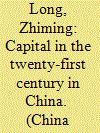

|
|
|
|
|
| Summary/Abstract |
We propose a method of constructing a general capital stock à la Piketty for China from 1952 to 2015 (Part 1). The elasticities of income with respect to this capital are econometrically estimed through equations which also integrate human capital and R&D. The tests are performed within frameworks of modern neoclassical macrodynamic models. On this basis, we calculate an implicit rate of return of capital to test the validity of what Piketty states as a “fundamental inequality”, comparing rate of return on capital and income growth rate in the long run. This inequality is verified, but appears to be tendentiously challenged over the last decade. Then, Piketty's “second law”, arguing that the coefficient of capital tends to be equal to the ratio between savings rate and income growth rate, is examined. This “second law” is to be viewed as a process of asymptotic convergence in the long term (Part 2). These results are compared with new estimates for the post-1978 sub-period of “capitalism with Chinese characteristics”, but the fundamental inequality is no longer verified, and it is not reasonable to affirm the validity of the “second law” (Part 3). Finally, we address the issue of the inequalities in China.
|
|
|
|
|
|
|
|
|
|
|
|
|
|
|
|
| 5 |
ID:
101163
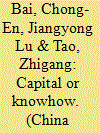

|
|
|
|
|
| Publication |
2010.
|
| Summary/Abstract |
China's success in attracting foreign direct investment has been cast in doubt as mainly a transfer of capital, not knowhow, because its financial system is incapable of allocating domestic savings and hard-earned foreign reserves to domestic enterprises. To shed light on this debate, we examine the determinants of equity sharing in Sino-foreign joint ventures with the premise that the roles of foreign direct investment (in transferring capital or knowhow) should be reflected in equity sharing between multinational firms and local firms. Our empirical analysis offers strong evidence for foreign direct investment as a transfer of knowhow, but limited support for foreign direct investment as a transfer of capital, which points to the need for further reform in China's financial system.
|
|
|
|
|
|
|
|
|
|
|
|
|
|
|
|
| 6 |
ID:
141095
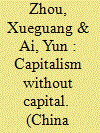

|
|
|
|
|
| Summary/Abstract |
Situated in an agricultural township in northern China, this study examines the rise of produce markets in rural China in the face of a chronic shortage of financial capital. Drawing on theoretical ideas in economic sociology, we explicate the mechanisms of gift exchange and credit taking and the conditions under which these mechanisms are used to mobilize financial capital and to facilitate market transactions in the absence of financial capital. We illustrate these issues and ideas using our fieldwork research on different produce markets and entrepreneurial activities.
|
|
|
|
|
|
|
|
|
|
|
|
|
|
|
|
| 7 |
ID:
126995
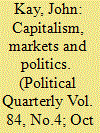

|
|
|
|
|
| Publication |
2013.
|
| Summary/Abstract |
The term 'capitalism' is no longer a relevant way in which to describe or to understand a modern economy. Ownership of capital is not the source of economic power that it once was. Business leaders of today do not own the factories and the machines, nor do they need to. Let us consider instead, markets. Not the markets for financial products that we see depicted on rows of flickering screens in Canary Wharf, but real markets. Market economies have proved to be chaotic, and imperfect and yet they are the most successful way we know to allocate goods and services. Through a process of experimentation, much failure and some success they evolve. Their development is necessarily uncertain, but that is also their greatest strength.
|
|
|
|
|
|
|
|
|
|
|
|
|
|
|
|
| 8 |
ID:
155747
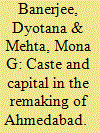

|
|
|
|
|
| Summary/Abstract |
The city has been eulogized as a liberating space of anonymity where identities of caste and creed dissolve before the might of economic capital. This paper examines how the role of caste is both masked and intensified in the formation of new neighbourhoods in the backdrop of city-remaking projects. Our ethnographic study of Dalit-dominated neighbourhoods in Ahmedabad shows that the emergence of a middle-class neighbourhood in Ahmedabad’s periphery must be seen as a ‘post-liberalization Dalit ghetto’ that is distinct from the pre-liberalization Dalit neighbourhoods in the industrial centre of the city. The new Dalit middle-class neighbourhood of Chandkheda is a result of greater economic mobility among Dalits which continues to be marked by the three exclusionary mechanisms: ‘moving up’ and into segregation; caste vigilantism; and protean forms of intra-Dalit exclusion. The collusion of caste and capital produces unexpected forms of space politics that tend to enhance rather than dissolve distinctions based on micro-caste identities in middle-class residential spaces, all the while hiding new forms of exclusion behind the rhetoric of secularized urban development.
|
|
|
|
|
|
|
|
|
|
|
|
|
|
|
|
| 9 |
ID:
085261
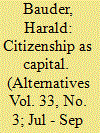

|
|
|
|
|
| Publication |
2008.
|
| Summary/Abstract |
As subordinate workers, migrants and foreigners are an essential labor force for industrialized economics.
|
|
|
|
|
|
|
|
|
|
|
|
|
|
|
|
| 10 |
ID:
152199
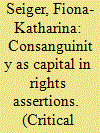

|
|
|
|
|
| Summary/Abstract |
This paper examines the material dimensions of ethnic identity claims by Japanese-Filipino children in the Philippines and non-governmental organizations (NGOs) advocating on their behalf. Most Japanese-Filipino clients of NGOs in the Philippines were raised by their Filipino families with little knowledge of their Japanese fathers and little or no lived experience of Japan. Although these children and young adults are often called “multi-cultural” by NGO workers, they frequently grow up with no connection to Japan other than an awareness of their Japanese parentage and Japanese cultural products equally accessible to most Filipinos. I argue that filiation can be leveraged to gain access to resources not only through the legal implications that are provided by biological relationships, but also through symbolically salient claims for belonging to a nation or people by virtue of descent. This consanguineal capital should primarily be understood in politically symbolic terms, mobilized in processes of claims-making and based on notions of “blood” and belonging and their frequent conflation with ethnicity.
|
|
|
|
|
|
|
|
|
|
|
|
|
|
|
|
| 11 |
ID:
154478
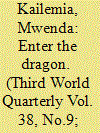

|
|
|
|
|
| Summary/Abstract |
This article draws on the theory and recent research on ‘ecological disorganization’- defined as ‘the ways in which human preferences for organizing economic production consistent with the objectives of capitalism are an inherent contradiction with the health of the ecological system’- to explore the ‘corporate violence’ apropos of Chinese investment in Africa. In line with other ecological disorganization theorists, we show how the deployment of Chinese capital in Africa structures and reproduces subjectivation, but also how, ultimately, this subjectivation is implicated in Africa’s ecological disorganization.
|
|
|
|
|
|
|
|
|
|
|
|
|
|
|
|
| 12 |
ID:
043363
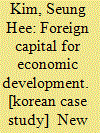

|
|
|
|
|
| Publication |
New York, Praeger Publishers, 1970.
|
| Description |
xxiii, 206p.
|
| Series |
Praeger special studies in International economics and developemnt
|
|
|
|
|
|
|
|
|
|
|
|
Copies: C:1/I:0,R:0,Q:0
Circulation
| Accession# | Call# | Current Location | Status | Policy | Location |
| 007185 | 338.9109519/FIM 007185 | Main | On Shelf | General | |
|
|
|
|
| 13 |
ID:
141765
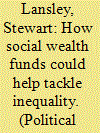

|
|
|
|
|
| Summary/Abstract |
This article examines the potential to tackle the roots of inequality by the introduction of one or more social wealth funds. Such funds would aim to capture some of the financial gains from the private ownership of capital—a principal driver of inequality—and use the proceeds for wider community benefit, such as investment in social infrastructure. In recent decades a number of countries have introduced a variant on such funds, mostly taking the form of state-owned sovereign wealth funds resourced through the exploitation of oil, and used for a diversity of economic purposes. In contrast, the UK has failed to take the opportunity to create such funds by, for example, reinvesting the revenue from the sales of public assets. So would it be possible to build one or more such collectively owned funds in the UK, and if so, how should they be financed? As well as funding social investment and anti-inequality programmes, could such a scheme also help finance a regular Citizen's Dividend payment or a Citizen's Income scheme?
|
|
|
|
|
|
|
|
|
|
|
|
|
|
|
|
| 14 |
ID:
097224
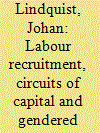

|
|
|
| 15 |
ID:
192941
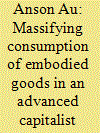

|
|
|
|
|
| Summary/Abstract |
Embodied goods like cosmetic surgery comprise a unique and growing consumer industry, most of all in the Asia-Pacific, yet the rationalisation processes motivating their purchase are less understood. Addressing this lacuna, this article builds upon open-ended surveys and semi-structured interviews of consumers in Seoul, South Korea to articulate a relational approach to examine the rationalisation of purchases of cosmetic surgery as an embodied good. Theorised through the conceptual lens of Bourdieusian capital, participant accounts point to macro-level economic anxieties that inform a micro-level cognitive logic of competition through which consumers rationalise the purchase of embodied goods as a form of aesthetic capital. When performed, this capital is believed to offer actors social distinction that provides workplace and social networking advantages by impressing gatekeepers and alters. Participants are shown to reconceptualise their bodies in a means-end orientation for upward mobility but stress their resignation and powerlessness in being forced to adopt this instrumental reconceptualisation as a response to intensifying economic hardships in contemporary capitalist South Korea.
|
|
|
|
|
|
|
|
|
|
|
|
|
|
|
|
| 16 |
ID:
071987
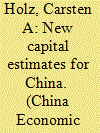

|
|
|
|
|
| Publication |
2006.
|
| Summary/Abstract |
Data on physical capital are an indispensable part of economic growth and efficiency studies. In the case of China, economy-wide fixed asset series are usually derived by aggregating gross fixed capital formation (net of depreciation) over time, and sectoral/ownership-specific series by correcting the limited official fixed asset data available. These procedures, to varying degrees, ignore that (i) gross fixed capital formation does not equal investment, (ii) investment does not equal the value of fixed assets newly created through investment, (iii) depreciation is an accounting measure that bears no necessary relation to changes in the production capacity of fixed assets, (iv) official fixed asset data, where available, incorporate significant revaluations in the 1990s, and (v) "net fixed assets" do not measure the contribution of fixed assets to production.
This paper derives economy-wide fixed asset values for 1953-2003, correcting for these shortcomings. It uses both the traditional, cumulative approach and a new, so far unexplored method of combining economy-wide depreciation values and an economy-wide depreciation rate to directly yield economy-wide fixed assets. The derived fixed asset time series are evaluated in a comparison with each other as well as with series in the literature, leading to the recommendation of a specific choice of fixed asset time series.
|
|
|
|
|
|
|
|
|
|
|
|
|
|
|
|
| 17 |
ID:
141200
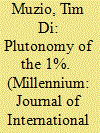

|
|
|
|
|
| Summary/Abstract |
This article offers a study on the plutonomy of dominant owners and what their consumptive practices might tell us from the lens of the capital as power framework in IPE. I argue that the differential consumption of dominant owners is an important dimension of an internationalised capitalist mode of power for two reasons. First, Nitzan and Bichler argue that the primary driver of accumulation is the desire for differential power symbolically expressed in a magnitude of money. In this article, I argue that there is a secondary dimension noted but underdeveloped in their framework and influenced by Veblen: the drive for social status and the display of positionality through differential intraclass consumption. Second, as identified by Kempf, I argue that the consumptive practices of dominant owners are helping to lock global society into an unsustainable and ethically indefensible quest for perpetual economic growth. This growth project not only undermines calls for needed social and economic change but also threatens populations with environmental collapse.
|
|
|
|
|
|
|
|
|
|
|
|
|
|
|
|
| 18 |
ID:
151238
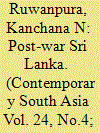

|
|
|
|
|
| Summary/Abstract |
Sri Lanka has been through vicissitudes of change in the past three decades and its current political order gives the impression of the possibility for a different vision for Sri Lanka. Yet in order to appreciate the continuities and disruptions to Sri Lanka’s polity and the possibility of a politics of reconciliation, the contributors to this special issue argue that we also need to redirect our attention away from the state. It is an initial call that seeks to disentangle the ways in which the various constituents that make up the state, including capital and labour, are also implicated or suffer from a tragic perpetuation of an ethno-nationalist agenda that keeps morphing into various guises at fraught moments. A politics of reconciliation then, it suggests, cannot simply be limited to a political package that does not recognize the very economic disempowerment of large segments of people. The contributors to this special issue come from varying disciplines and adopt a range of methods to explore how this politics of reconciliation is understood, endorsed and contested in the everyday lives of Sri Lankan people.
|
|
|
|
|
|
|
|
|
|
|
|
|
|
|
|
| 19 |
ID:
176821
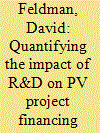

|
|
|
|
|
| Summary/Abstract |
Energy technology research and development (R&D) typically focuses on advancing the performance and reducing equipment and installation costs. However, such R&D can also have significant indirect impacts on other factors. Incorporating the impact that R&D activities have on financing costs can provide a more complete picture of the consequences of these decisions, and may allow policymakers to make better decisions. In this paper we discuss some historical examples of R&D impacting financing costs in the solar energy sector, summarize the areas of R&D that can impact financing, and describe methodological approaches that can be used to quantify the impact of R&D on financing costs and, as a result, the levelized cost of energy (LCOE). We estimate that R&D-driven reductions in financing costs in the solar sector, from current levels to low-risk levels, could reduce LCOE approximately 25%. Alternatively, without the R&D advances needed to prevent future risks and complications, financing costs in the solar sector could increase by as much as 115%.
|
|
|
|
|
|
|
|
|
|
|
|
|
|
|
|
| 20 |
ID:
141600
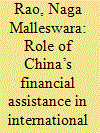

|
|
|
|
|
| Summary/Abstract |
The movement of money fromone country to another country for development in the formof aid is known as the foreign aid. The Foreign capital or assistancehelps to reduce the shortage of domestic savings of the recipientstate. This willensuretheinflow of capital, equipment, technology and raw materials thereby raising of capital formation in the country.
|
|
|
|
|
|
|
|
|
|
|
|
|
|
|
|
|
|
|
|
|